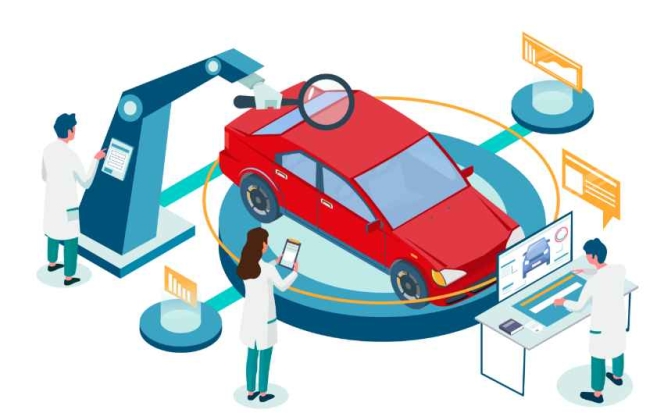E-learning in the automotive industry
- By Deepshikha Kumar
- August 24, 2020

The pandemic is not yet over. Lockdowns will continue to halt the industries in the near future. Amidst these uncertainties and challenges, companies will compel to adopt the work from home culture. As learning is the part and parcel of growth and it cannot be stopped so long as businesses have desires to survive and grow, e-learning will rise as true saviour

With an average annual turnover of USD 2.75 trillion, the world automobile industry is one of the most significant contributors to global GDP. The industry is also known for creating massive employment opportunities and facilitating road transport. For decades, the automotive industry is considered as a cradle of technological as well as operational innovations, and the majority of players in this sector take regular initiatives to up-skill and re-skill their employees. As technology always paves a golden path for development, the onset of e-learning has proved that it is a boon for the industry.
Towards a smooth track
The automobile industry has gone through rapid developments in the last two decades, be it the introduction of the electronic gearbox system or mass production of electric vehicles, every change brings along new opportunities as well as challenges. To train their employees about new products and procedures and raising their productivity, auto companies regularly organise customised training programmes. While conducting such training programmes, management often comes across two big challenges. These are ensuring the availability of a huge workforce in various geographical locations for a scheduled session and choosing programmes that may cater to the needs of employees from different departments. But, when the automobile companies switched to e-learning, these problems get easily resolved.
Now, using e-learning training modules, employees in any part of the world can access to bespoke training programmes tailored by industry experts and that too without any time limitation. Sometimes lack of proficiency in a particular language may cause hindrance in learners’ understanding, but e-learning platforms which provide curated content in multiple languages have also removed this barrier very effectively. As far as the cost-cutting is concerned, e-learning is effective in this direction, too. Unlike exorbitant conventions which incur a hefty cost in terms of thought leaders’ fee, location expenses, and a large amount on logistics, e-learning is absolutely frugal.
Benefits of multiple lanes
E-learning training programmes are useful in developing both hard and soft skills among employees. Detailed and interactive videos by the seasoned trainers can be replayed n numbers of time by an individual to derive maximum from a course module. Besides, s/he has the option to choose more than one online coach or subject matter expert. The content can be further customized to topics of business relevance depending on an organisation’s requirements. Moreover, with the unprecedented developments in region-specific virtual training programmes, the industry is receiving immense benefits of localised content in vernacular languages. Now, apart from OEMs, ancillaries and retailers are also training the workforce as per their specific needs and that too in their preferred languages. Hence, locally hired employees in showrooms and dealership networks are not facing any constraints while re-skilling/up-skilling themselves.
Safe to turn
After the outbreak of Coronavirus, not only the automobile sector but the entire world economy got afflicted with the lockdown. As businesses cannot be shut for a long, work from home emerges as the new norm. The pandemic is not yet over, in one part of the world or the other, lockdowns will continue to halt the industries in the near future. Amidst these uncertainties and challenges, companies will compel to adopt the work from home culture. As learning is the part and parcel of growth and it cannot be stopped so long as businesses have desires to survive and grow, e-learning will rise as true saviour.
Learning from test drive
An effective training programme is one which leaves a desirable impact on trainees and improves their performance. So, assessment always plays a pivotal role while gauging the outcome of training. E-learning training modules work better in this aspect, too. Empowered with great analytical tools, algorithms, and artificial intelligence (AI), measuring the performance of a training programme is much easier in the case of e-learning. Moreover, based on efficacious feedback, desirable changes can be incorporated in future programmes. Hence, flexibility and customisation make e-learning unmatched in business and corporate training.
Heading into smart age
The pace at which the automotive industry is approaching towards smart and driver-less vehicle foretells that the future is going to be immensely dynamic and tech-driven. Hereby, employees of the automobile companies must have to cope with the change with gradual knowledge and skill development. Smart vehicles will be made by smart people and for smart training, e-learning modules will be the smartest choice for employers and employees.
(The authors is the Founder & CEO of SpeakIn)
- Ecolomondo Corporation
- Hawkesbury TDP Facility
- End-Of-Life Tyres
- Tyre Recycling
- Crumb Rubber
- Recovered Carbon Black
- Export Development Canada
Ecolomondo Secures Additional $2.7M Financing From EDC For Hawkesworth Facility Ramp-Up
- By TT News
- February 16, 2026

Ecolomondo Corporation has finalised documentation with Export Development Canada (EDC) for an additional USD 2.7 million in financing aimed at advancing the final phase of operational ramp-up at its Hawkesbury tyre-derived products (TDP) facility. This follows a previously announced agreement in principle reached on 12 January 2026, concerning funding for capital investments and working capital needs at the Ontario site. Alongside this new financial support, EDC has also granted a temporary reprieve on principal and interest payments for existing loans throughout the company's 2026 ramp-up period.
The announcement coincides with recent operational milestones at the Hawkesbury plant, which achieved record production levels during the week of 12 January 2026. During this peak period, the facility successfully processed approximately 150,000 pounds of crumb rubber, yielding around 60,000 pounds of recovered carbon black, 75,000 pounds of tyre-derived oil and 15,000 pounds of syngas. This level of output corresponds to the processing of an estimated 9,375 end-of-life tyres, underscoring the facility's enhanced capacity and operational progress as it moves towards full-scale production.
Jean-François Labbé, Interim CEO, Ecolomondo, said, “This additional financing provides important financial flexibility as we complete the final stage of the Hawkesbury facility ramp-up. It also supports continued workforce expansion and a steady increase in production as we advance towards full operational capacity.”
Century-Old Tyre Service Company TH Pettersson Becomes Part Of Citira
- By TT News
- February 13, 2026

Citira has expanded its service network in western Sweden by acquiring TH Pettersson, a renowned tyre service company with two shops in the Gothenburg area. This acquisition adds two key service points positioned close to the region's major traffic and logistics hubs, significantly advancing Citira's coverage in this strategic area.
TH Pettersson holds a distinguished place in Swedish commercial history as one of the oldest tyre shops in the country, having been founded in 1923. From modest origins, the business grew to achieve a strong national reputation under the guidance of three generations of entrepreneurs who maintained a long-term value creation and service-driven philosophy. The two well-situated shops will now form crucial new service points within the Citira network.
The business will continue operating with the same team in the same premises, ensuring continuity for customers and staff alike. David Heidenfors, the long-term manager, together with the broader TH Pettersson team, will continue managing daily operations while benefiting from Citira's resources for continued development. As part of this new chapter, both Max Petersfeldt and Mikael Petersfelt will become co-owners of Citira.
David Boman, CEO, Citira, said, “We are very excited that TH Pettersson will join Citira, as we have regarded them as a key player in the Gothenburg area for a long time. The team delivers great service to their customers, which will now come to the benefit of our customers as well. In TH Pettersson, we have a great partner on Sweden’s west coast, which we look forward to further developing and growing together with David, the TH team and Max as a senior advisor.”
Max Petersfeldt of TH Pettersson said, “Joining Citira and a group of like-minded colleagues marks an important milestone in our journey while also allowing us to be part of and contribute to this exciting development in our industry. I am confident that under the continued leadership of David Heidenfors, Citira and TH Pettersson will realise our full potential in the region while allowing us to stay true to our customers, who will find us in the same place with the same team which they have always trusted.”
Bridgestone Accelerates Virtual Racing Presence As RIDE 6 Launches Globally
- By TT News
- February 13, 2026

Bridgestone has renewed its collaboration with game developer Milestone for the launch of RIDE 6, the latest title in the popular motorcycle racing franchise. This edition represents the most comprehensive instalment in the series to date, introducing new motorcycles, diverse terrains and authentic tracks. Continuing its role as the official tyre supplier, Bridgestone brings its real-world high-performance motorcycle tyres into the virtual environment. Players around the world can now experience the same grip and endurance that define the brand’s real-life products across roads, circuits and trails, thanks to the game’s updated dual-physics engine.
A major feature in this edition is the new RIDE Fest career mode, which immerses players in the journey of a professional rider competing against motorsport icons such as Casey Stoner and Troy Bayliss. Within this mode, a dedicated Bridgestone Challenge chapter allows users to test the brand’s tyres across various racing disciplines and surfaces, from endurance events to circuit racing. Bridgestone also sponsors the redesigned Riding School, a training module offering structured tutorials to help players refine their skills. The company’s motorsport expertise, particularly its success in the FIM Endurance World Championship, directly informs the tyre behaviour modelled in the game. Virtual riders must consider tyre degradation, respond to changing track conditions and make tactical choices, mirroring the strategic depth found in real-world racing.
The presence of Bridgestone has been expanded throughout RIDE 6, with enhanced branding featured across menus, tracks and gameplay elements. The tyre lineup itself has grown to include recent additions to the BATTLAX family, such as the RACING BATTLAX V03 slick, engineered for maximum circuit performance and faster lap times, alongside the road-legal RACING STREET RS12, which offers superior dry grip. For the first time in the series, off-road segments are included, enabling players to equip adventure-focused tyres like the BATTLAX ADVENTURECROSS AX41. Other available options include the ADVENTURE TRAIL AT41, the RACING BATTLAX W01 and the HYPERSPORT S23.
With more than 340 motorcycles from 21 manufacturers, all fitted with Bridgestone’s virtual tyre models, the game boasts the most varied selection in the franchise’s history. Built using Unreal Engine 5, RIDE 6 is now accessible on PlayStation 5, Xbox Series X|S and PC through Steam and the Epic Games Store.
Nico Thuy, Director Motorcycle at Bridgestone EMEA, said, “RIDE 6 is the most realistic and wide-ranging entry in the series so far, and that makes it the ideal platform to showcase our large premium motorcycle tyre portfolio and its performance. With expanded modes, new features and a stronger Bridgestone presence throughout the experience than ever before, the game takes our longstanding partnership with Milestone to the next level. Through the RIDE series, we’re both strengthening our leadership in motorcycle tyres and showcasing our racing legacy in a fun, engaging way to riders and gamers worldwide.”
- Pirelli
- Pirelli P Zero Tyres
- Pirelli P Zero DHG
- Pirelli Cinturato WHB
- Porsche 911 GT3
- Porsche Carrera Cup North America
- Forest Stewardship Council
Pirelli Named Official Tyre Supplier In Landmark Porsche Carrera Cup North America Deal
- By TT News
- February 13, 2026

Porsche Carrera Cup North America is entering a new chapter defined by a significant technical partnership and the introduction of an updated race car. A multi-year agreement has been established making Pirelli the official tyre supplier for the championship, marking the first time in the series' six-year history that it will compete on Pirelli rubber. This collaboration reinforces the connection between motorsport engineering and road car performance, a link demonstrated by the bespoke Pirelli P Zero R and P Zero Trofeo RS tyres developed for the road-going Porsche 911 GT3.
The 2026 season will debut the new Type 992.2 Porsche 911 Cup car, an evolution of the brand's successful single-make racer with refinements focused on raceability and handling. It will compete in only four global championships, including the North American series. These cars will be fitted with the Pirelli P Zero DHG tyre, a control tyre already introduced across Pirelli’s global GT championships in 2025. For wet conditions, teams will use the Pirelli Cinturato WHB, the standard wet weather tyre for GT classes since last year.
The P Zero tyres used in the series will carry the Forest Stewardship Council logo, signifying a commitment to sustainable sourcing. This certification ensures the natural rubber originates from forests managed to preserve biodiversity and support local communities, with a supply chain that rigorously separates certified materials from non-certified sources.
The new partnership and the new car will make their on-track debut together during a series-wide test at Sebring International Raceway in mid-February. The 2026 championship season will officially commence at the same venue from 18th to 20th March, running in support of the IMSA WeatherTech Championship’s Mobil 1 Twelve Hours of Sebring.
Volker Holzmeyer, President and CEO, PMNA, said, “Porsche and Pirelli share a deep motorsport heritage and a commitment to innovation that carries from the track to the road. We’re excited to welcome Pirelli to our premier Porsche One-Make series as we usher in a new era with the 911 Cup and new Pirelli tyres beginning in 2026.”
Claudio Zanardo, President and CEO, Pirelli North America, said, “Pirelli is thrilled to partner with Porsche Motorsport North America as the tyre supplier for the Porsche Carrera Cup North America, adding to our extensive portfolio of top-level championships supported worldwide. This collaboration demonstrates Pirelli’s dedication to performance and innovation, bringing race-proven technology from the track to the road. Just as Porsche vehicles set the standard for driving excellence, our P Zero tyres define precision, handling and performance in both competition and everyday driving. With motorsport rapidly expanding across North America, attracting more fans and creating new opportunities to showcase high-performance engineering, we are excited to strengthen our presence and support this momentum. Taking on this challenge alongside Porsche, its teams, drivers and the iconic 911 Cup cars is an opportunity for continuous innovation, collaboration and growth throughout the season.”







Comments (0)
ADD COMMENT